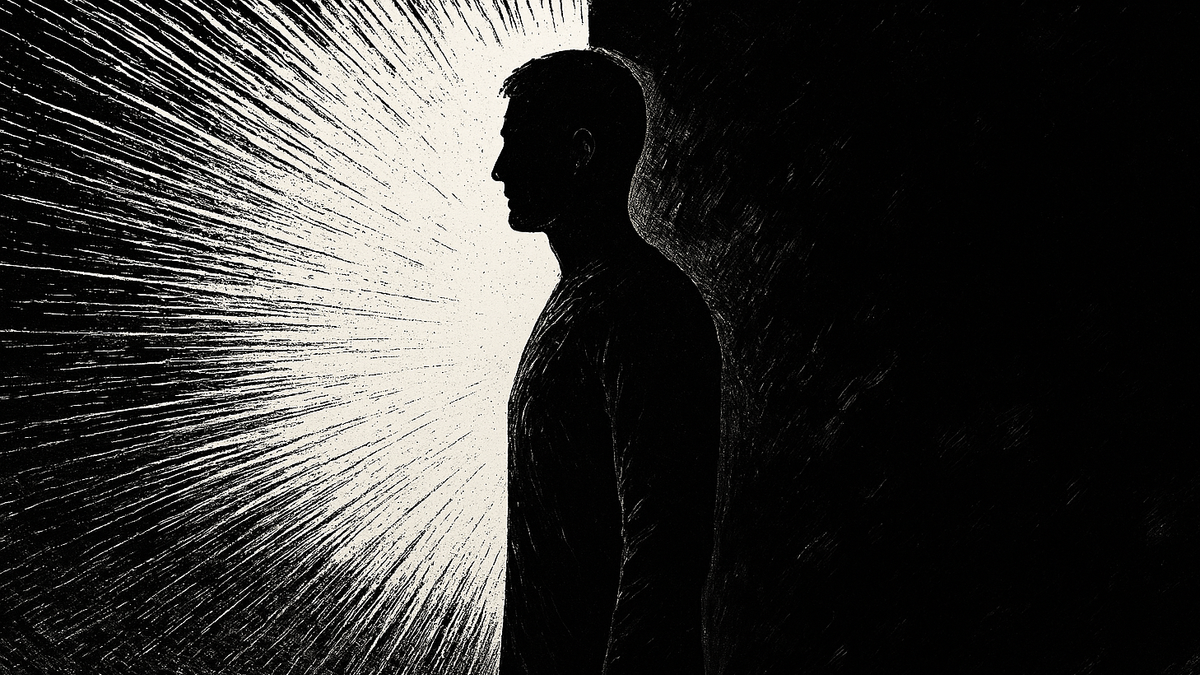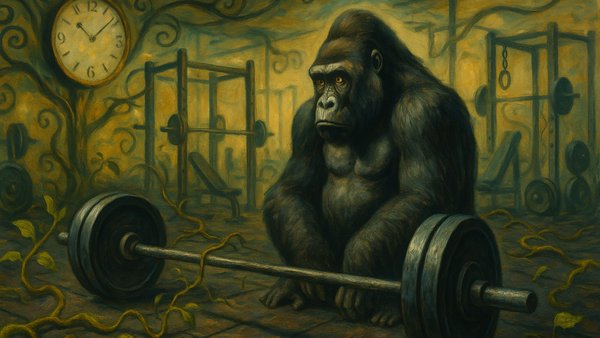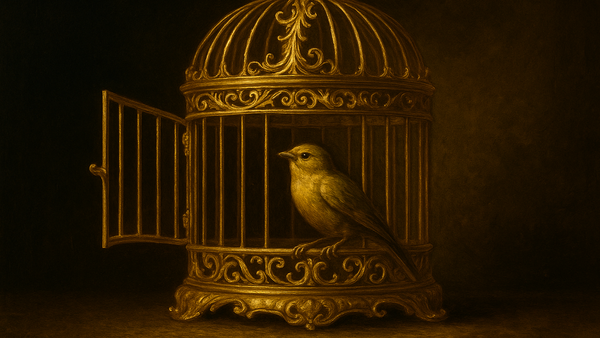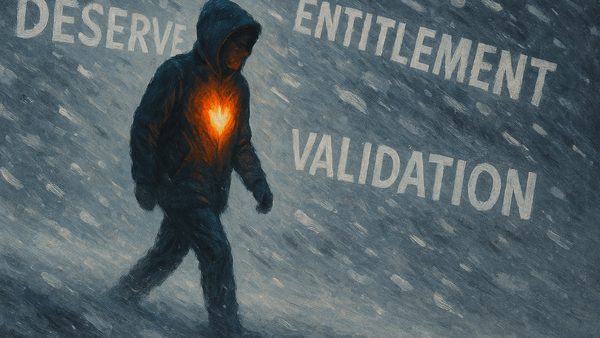The Practice of Forgiveness
Explore the hidden forces that shape human nature—fear, hunger, ambition—and uncover the key to mastering yourself. This week’s issue is about data protection, animals, and music.

We see people act selfishly, cruelly, dishonestly, and we judge them. We stand firm in our belief that they should be better, should be more righteous, should behave as we expect them to. Yet the moral compass we wield against others is rarely a universal truth—it is a self-serving construct, shaped by the unique circumstances of our own lives.
Humans revel in absolutes. We convince ourselves that some actions are inherently right and others inherently wrong, yet we fail to acknowledge that morality is shaped by our very own needs, desires, and experiences. Strip away self-righteousness, and what remains are the primal instincts of survival—fear of suffering, exclusion, and loss. Our internal moral systems are not built on objective truths but on individual experiences, finely tuned to secure our place in the world. And the moment circumstances change, so does our morality.
Instincts of Survival
Fear is at the root of much human behavior—the engine behind cruelty, greed, submission, domination, even love and ambition. Many dark and desperate acts can be traced back to one simple truth: We are terrified. Greed, violence, betrayal, tyranny, jealousy, lies—all stem from the fear of scarcity, weakness, suffering, insignificance, abandonment, rejection, and punishment. Even pleasure-seeking—addiction, overindulgence, obsession with status or lust—is often just a frantic distraction from the ultimate fear: Death—the knowledge that one day, everything will slip into blackness.
Humans exhibit many prey-like traits: whites in our eyes (helpful for tracking group members, like herd animals), an instinctive fear of sudden movements or loud noises. But unlike true prey—who rely on speed, camouflage, or herding for survival—humans developed weapons, fire, and strategy to turn the tables. We evolved into apex predators through intelligence, tool use, and social cooperation.
Though we retain prey-like instincts—hypervigilance, startle responses, fear of the unknown, herd behavior—we also possess predator traits: forward-facing eyes (built for focus and pursuit), aggression and territoriality, adaptability and ruthlessness, tool use, and hunting strategies. We are not simply prey or predator; we are something more complex.
Fear alone is not the root of all we call evil. Cowardice, deceit, submission, betrayal, greed, selfishness, cruelty, dominance, conquest, sadism, destruction—all these can stem from both a need to avoid suffering and a drive to consume and control. A man might betray his brother not out of fear but to rise above him. A tyrant might not crush his people to preserve power but because he enjoys their submission. And a man might not kill to survive but to prove—to himself or the world—that he holds the power of life and death.
The human mind is the mind of a creature torn between two forces: the prey’s fear of being hunted and the predator’s hunger[1] to hunt. Modern society magnifies fear—of failure, rejection, and loss—but it is only one half of the equation.
From Instinct to Self-Mastery
If someone tells you, “You shouldn’t chase money, sex, or ambition,” ask yourself: Is this a moral truth? Or is it a reflection of their own fears, their own unresolved conflicts, or the resentful greed of a hunter? People often insist we shouldn’t do what they have either failed to achieve or wish to prevent others from obtaining.
When people judge harshly, it often mirrors their inability to accept their own flaws. Judgment is just a projection. To see the good in others, to recognize mistakes without instant condemnation—this is an act of self-recognition. Every time we refrain from labeling someone as wholly good or wholly bad, we grant ourselves the same grace.
This is the practice of forgiveness. It begins with understanding: others act as they do because they fight their own battles, driven by their own fears and hungers. To forgive others is, in truth, to forgive ourselves. The less we condemn others, the less we punish ourselves. When we embrace the complexity in others, we gain the ability to embrace it within ourselves. Finding the grey area in people is finding the grey area in ourselves—allowing us to transcend, grow beyond, and master our instincts.
Instead of lamenting that people lie, steal, and deceive, we must recognize that these behaviors stem from the same instincts, the same strengths and weaknesses that exist within us and manifest on one way or another. Let’s not waste energy resenting human frailty. Instead, let’s become leaders who bring value, a force that others want to align with. The majority of people lack a solid grasp of their own values, operating near completely on autopilot, their entire reality revolving around their cravings and aversions. They need leaders who are grounded, real, and unapologetically themselves.
Becoming such a leader means being utterly grounded in yourself—standing bare and unguarded in your quirks, flaws, and idiosyncrasies—while driving your roots deep into the earth. When you own who you are, no one can wield it against you. People are drawn to this unshakable inner strength. Vulnerability, when fully embraced, ceases to be weakness; it transforms into confidence—a beacon of guiding light for others.
Practicing forgiveness is the first step on this path. It is not merely an act of love—it is an act of self-liberation. All judgment is ultimately projection. The more you forgive and accept the fears and hungers that drive others, the more you will be able to accept and forgive yourself. To forgive is to understand, and to understand is to find peace.
⏤Ferdinand
The term hunger is only partially accurate but not entirely precise. If fear is the instinct to avoid suffering, pain, and death, its opposite should be the drive to pursue, expand, dominate, and indulge. Hunger implies craving—whether for power, pleasure, or survival—but it is too passive, suggesting need rather than force. Will, drive, or lust (in its broader sense) better capture the active, relentless energy that creates, conquers, and destroys, yet remain too broad. Desire conveys yearning but lacks the aggressive, domineering edge this force demands. ↩︎
✨ Sunday’s Sparks
🌐 Website: Cover Your Tracks
Online tool from the Electronic Frontier Foundation that lets you run a test to see how well your browsing is protected from tracking and fingerprinting. It shows you how trackes see your browser and list the most unique and identifying characteristics.
📚 Book: Beyond Words, Carl Safina
Compelling exploration of animal consciousness, challenging assumptions about human superiority by revealing intelligence, emotions, and social structures in species like elephants, wolves, and whales. Safina, a marine ecologist, blends science with storytelling to illustrate how animals think, feel, and communicate in ways strikingly similar to humans. Beyond Words urges a reevaluation of humanity’s relationship with nature, emphasizing the need for greater empathy and conservation efforts.
Chimpanzees hold a mirror up to us, challenging us to see the ape reflected. Often, we don’t recognize ourselves. Chimpanzees can be as darkly, murderously ambitious as Roman senators, as if there is a human pent up inside them, brachiating toward Eden and our birth, a genie waiting to be released from its bottle and let loose upon the world. But we humans are already out of the bottle. In who we are, in how we are, we have much reason to feel pride and shame. If cruelty and destructiveness are bad, humans are by a wide margin the worst species ever to infest this planet. If compassion and creativity are good, humans are by a wide margin the finest. But we are neither simply good nor bad; we are all these things together, and imperfectly so. The question for all is: Which way is our balance trending?
🎵 Music: Vladimir Horowitz plays Rachmaninoff : Prelude 5 In G Minor
One of my favorite piano pieces, written by one of the greatest composers of all time and interpreted by one of the greatest pianists of all time.
Sergei Rachmaninoff, Prelude No. 5 in G minor, Op. 23/5, Allegro, composed in 1901 and published in 1903, interpreted by Russian-American pianist Vladimir Horowitz.
💡 Sunday’s Wisdom
In the fourth year of medical school, I watched as, one by one, many of my classmates elected to specialize in less demanding areas (radiology or dermatology, for example) and applied for their residencies. Puzzled by this, I gathered data from several elite medical schools and saw that the trends were the same: by the end of medical school, most students tended to focus on “lifestyle” specialties—those with more humane hours, higher salaries, and lower pressures—the idealism of their med school application essays tempered or lost. As graduation neared and we sat down, in a Yale tradition, to rewrite our commencement oath—a melding of the words of Hippocrates, Maimonides, Osler, along with a few other great medical forefathers—several students argued for the removal of language insisting that we place our patients’ interests above our own. (The rest of us didn’t allow this discussion to continue for long. The words stayed. This kind of egotism struck me as antithetical to medicine and, it should be noted, entirely reasonable. Indeed, this is how 99 percent of people select their jobs: pay, work environment, hours. But that’s the point. Putting lifestyle first is how you find a job—not a calling.)
From When Breath Becomes Air
by PAUL KALANITHI
Captured with the powerful Kindle reader.
Did this issue spark something in you? Fuel Sunday Sparks’ independence.
Flows straight into content, not coffee.




